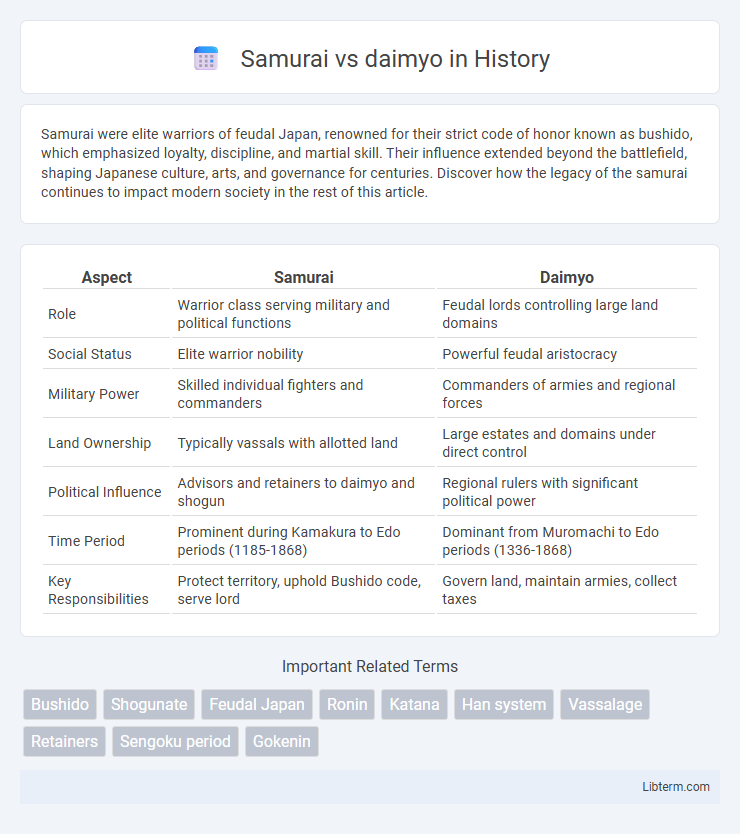Samurai were elite warriors of feudal Japan, renowned for their strict code of honor known as bushido, which emphasized loyalty, discipline, and martial skill. Their influence extended beyond the battlefield, shaping Japanese culture, arts, and governance for centuries. Discover how the legacy of the samurai continues to impact modern society in the rest of this article.
Table of Comparison
| Aspect | Samurai | Daimyo |
|---|---|---|
| Role | Warrior class serving military and political functions | Feudal lords controlling large land domains |
| Social Status | Elite warrior nobility | Powerful feudal aristocracy |
| Military Power | Skilled individual fighters and commanders | Commanders of armies and regional forces |
| Land Ownership | Typically vassals with allotted land | Large estates and domains under direct control |
| Political Influence | Advisors and retainers to daimyo and shogun | Regional rulers with significant political power |
| Time Period | Prominent during Kamakura to Edo periods (1185-1868) | Dominant from Muromachi to Edo periods (1336-1868) |
| Key Responsibilities | Protect territory, uphold Bushido code, serve lord | Govern land, maintain armies, collect taxes |
Origins of the Samurai and Daimyo
Samurai originated during Japan's Heian period as skilled warriors serving noble families, evolving into a distinct military class by the Kamakura era. Daimyo emerged later in the Muromachi period as powerful territorial lords who controlled large land holdings and maintained private samurai armies. Both classes played pivotal roles in Japan's feudal hierarchy, with samurai serving as the military elite under the authority of the daimyo.
Defining the Roles: Samurai vs. Daimyo
Samurai were the warrior class in feudal Japan, serving as loyal retainers skilled in martial arts and bound by the code of bushido, while daimyo were powerful territorial lords controlling vast lands and armies. Daimyo held political and economic authority over their domains, often employing samurai as military commanders and administrators. The relationship between samurai and daimyo was central to maintaining the hierarchical structure and governance of feudal Japan.
Social Hierarchy in Feudal Japan
Samurai occupied the warrior class in Feudal Japan's social hierarchy, serving as loyal retainers to the daimyo, powerful feudal lords who controlled vast landholdings and maintained private armies. The daimyo held significant political and economic power, overseeing domains (han) and collecting taxes, while samurai enforced their authority and upheld Bushido, the code of conduct guiding loyalty and martial ethics. This hierarchical relationship reinforced the rigid class structure, with daimyo positioned above samurai yet reliant on their military expertise to maintain regional stability and power.
Duties and Responsibilities
Samurai were elite warriors responsible for military service, maintaining personal honor, and protecting their daimyo's land and interests through skilled combat and strategic defense. Daimyo acted as powerful feudal lords who governed large territories, managed political alliances, collected taxes, and maintained order within their domains by overseeing samurai retainers. The samurai's loyalty and martial expertise directly supported the daimyo's authority and governance, ensuring stability and control in feudal Japan.
Codes of Conduct: Bushido and Governance
The samurai adhered strictly to the Bushido code, emphasizing loyalty, honor, and martial virtue as fundamental principles guiding their conduct in battle and daily life. Daimyo, as powerful feudal lords, governed their domains through a hierarchical system that balanced military authority with administrative duties, often relying on samurai to enforce their rule while upholding the Bushido ethos. The interplay between Bushido and daimyo governance established a dual framework where samurai loyalty ensured political stability and reinforced the daimyo's control over their territories.
Military Power and Warfare
Samurai served as the elite warrior class in feudal Japan, primarily responsible for combat, military discipline, and tactical execution on behalf of their daimyo, the powerful territorial lords. Daimyo controlled large armies, managed resources, and strategized warfare campaigns, relying on their samurai retainers for battlefield effectiveness and enforcing their domain's military power. The symbiotic relationship between daimyo and samurai was crucial in maintaining regional control and dominance during periods of conflict such as the Sengoku era.
Economic Influence and Landownership
Samurai, as retainers and warriors, depended on stipends derived from the land controlled by daimyo, who were powerful feudal lords owning vast estates across Japan. The daimyo's economic influence stemmed from their ability to control agricultural production and collect taxes, which funded their armies and governance. Landownership established a rigid hierarchy where samurai loyalty ensured military strength, while daimyo managed economic resources to maintain political power.
Political Authority and Alliances
Samurai were elite warriors who served under daimyo, powerful regional lords controlling vast territories in feudal Japan. Political authority was centralized in daimyo, who maintained loyalty through strategic alliances with samurai, granting them land or stipends in exchange for military service. These alliances reinforced the daimyo's power, enabling them to govern and protect their domains effectively while influencing broader political dynamics.
Samurai-Daimyo Relationships and Rivalries
Samurai served as the military retainers of daimyo, forging bonds of loyalty in exchange for land or stipends, which cemented feudal hierarchies in Japan. Rivalries often arose between samurai serving competing daimyo, intensifying regional clashes and shaping political alliances during the Sengoku period. These complex relationships balanced cooperation and conflict, influencing power dynamics within samurai clans and shaping the territorial ambitions of daimyo lords.
Legacy and Cultural Impact in Modern Japan
The legacy of samurai and daimyo remains deeply embedded in modern Japan's cultural identity, symbolizing honor, discipline, and leadership. Samurai ethics, including Bushido, continue to influence contemporary martial arts, literature, and popular media, reinforcing ideals of loyalty and perseverance. Daimyo contributions to regional governance and patronage of arts have shaped Japan's historical narrative and preservation of traditional cultural heritage.
Samurai Infographic

 libterm.com
libterm.com